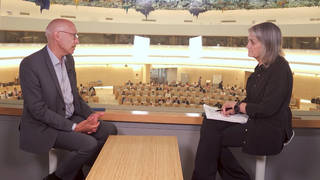
An explosive report sheds new light on Republican presidential nominee Mitt Romney’s time at Bain & Company, describing how the firm made millions on big tobacco by helping Philip Morris increase its revenues in the United States, and aiding two other tobacco titans to dominate the Russian market. According to the Huffington Post, “Romney’s consultants helped foreign firms and aspiring oligarchs decide how to corral Russia’s riches — including writing a official manual that outlined how best to navigate the process. At the same time, Bain leveraged its contacts with senior Russian officials to arrange sweetheart deals for its tobacco clients.” We’re joined by Zach Carter, senior political economy reporter at the Huffington Post. [includes rush transcript]
Transcript
NERMEEN SHAIKH: Despite some Bain deals ending in plant closings and layoffs, Romney has largely embraced his business record. He’s trumpeted his position at the corporation to portray himself as a wholesome salesman who’s brought stores like Staples and the Sports Authority to the middle class. However, an explosive new report by the Huffington Post sheds new light on Romney’s time at Bain & Company, the Boston consulting firm. It describes how the firm made millions on big tobacco by helping Philip Morris increase its revenues in the U.S., and aiding two other tobacco titans to dominate the Russian market.
The article is called “Mitt Romney’s Bain Made Millions on Big Tobacco in U.S., Russia.” In it, reporters Jason Cherkis and Zach Carter write, quote, “Romney’s consultants helped foreign firms and aspiring oligarchs decide how to corral Russia’s riches — including writing an official manual that outlined how best to navigate the process. At the same time, Bain leveraged its contacts with senior Russian officials to arrange sweetheart deals for its tobacco clients.”
Well, to find out more about the story, we go to Washington, D.C., where we’re joined by Zach Carter, the senior political economy reporter at the Huffington Post.
Zach Carter, welcome to Democracy Now! Can you talk about how you came across this story and what the key revelations are?
ZACH CARTER: So, we came across the story the way we’ve come across actually quite a bit of stories over the past six months: just through a reader tip. They wrote to offthebus@huffingtonpost.com and said, “You guys should really check out what Bain & Company was doing in the tobacco market in the early '90s, because there's been a lot of attention paid to Romney’s tenure at Bain Capital, this big Wall Street buyout firm, but not a whole lot of attention paid to Bain & Company, which is actually a bigger firm that does consulting,” you know, a bunch of experts sort of going around with Excel charts, you know, trying to improve the efficiency of different companies.
And what we found when we dug through a major database of tobacco documents, that had been released in conjunction with all the class action suits against tobacco companies over the years, was that Bain & Company had played a pretty significant role, especially in Russia. In the United States, they had worked with Philip Morris on a lot of pretty interesting marketing techniques. They had instructed Philip Morris that, you know, if you have any more than six brands of cigarettes up in a display at any time, you’re losing revenue. The maximum sort of revenue you can get from cigarette displays is six brands at a time. It’s a very scientific sort of process.
But in Russia, they got this great $3.9 million contract from the American government to go and advise Boris Yeltsin’s administration on how to privatize all of the Soviet Union’s resources at the turn of the '90s there, 1993. They then leveraged these contacts with top government officials into really great deals for private companies, including tobacco companies. The most prominent issue there is with British American Tobacco, major international tobacco conglomerate that had absolutely no presence in Russia prior to Bain's help, where Bain goes in and helps them buy—buy factories and then increase production. They believed that the Russian smoking market was sort of underdeveloped by about 33 percent. And since Bain’s involvement, smoking rates in Russia have gone up very significantly.
AMY GOODMAN: Can you talk, Zach, about whether what they were doing in Russia would have been legal here in the United States?
ZACH CARTER: So, there are a lot of cases you could make that the type of behavior that was going on would not be allowed in the United States. One of the more interesting transactions that we looked at was this purchase of a factory in the Russian region called Saratov. Even the relationship that Bain had between British American Tobacco and the Russian government at the time may have run afoul of conflict-of-interest rules for government contractors in the United States. We don’t know, because it’s 20 years old, and the government agency, USAID, was unable to really give us any sort of straight answer about something that happened so long ago.
But the type of deal they set up—British American Tobacco did not want other sort of Russian investors to know that it was making a play for tobacco factories, because it was afraid that those—those sort of current owners would then demand higher prices because this big company was involved. So they asked Bain to buy the shares for them directly. Now, the problem is, when—in most markets, including Russia at the time, when you buy stock in a company on behalf of another company, you’re acting as a broker. You’re serving this sort of financial intermediary function, and you should be subject to financial regulations as a result. And, of course, Bain did not want to be subjected to those regulations. You also have to pay taxes when you buy things, and particularly in Russia at the time. If you’re just—even if you’re just buying it on behalf of somebody else, you’ve got to pay a tax. And Bain didn’t want to be taxed for that, and they didn’t want to be subject to these tax—a tax investigation that Russian tax authorities were looking at at the time. So, instead of having Bain buy it directly on behalf of British American Tobacco, they had a Bain employee buy the stock.
The transaction—all the money was wired directly to the personal account of a Bain employee and a lawyer who was working for Bain, and then they paid off these Russian investment firms in cash, and then, at other times, Russian workers and Russian pensioners with packets of rubles. And that type of behavior, serving as a straw buyer in the United States, can be really problematic. If I buy a car and then give it to my brother, for instance, that’s not a problem. But if I buy a house, pretending to be my brother in order, you know, to get a loan that he wouldn’t qualify for, that’s considered illegal. That’s considered fraud. So, having a straw buyer like that in order to mask an exchange which is otherwise illegal can be problematic. And so, with Bain dodging—dodging financial regulations and tax scrutiny, there could be a case made that that would not have been allowed in the United States. You also have to look at just the sheer—the idea of representing yourself to be the buyer when you’re actually buying on behalf of someone else to get a lower price. That’s something that, you know, someone could make a case, would be wire fraud in the United States.
NERMEEN SHAIKH: But, Zach, how unusual was this kind of business conduct in Russia at the time? I mean, how does Bain’s conduct compare to other U.S. companies operating in the country at the time that all these companies were being privatized there? And why is this story especially relevant now?
ZACH CARTER: Well, I think what’s really interesting about this story is that people really haven’t looked at what these relatively small firms like Bain were doing in the privatization arena. I mean, privatization was one of the biggest sort of economic swindles of the 20th century. The whole idea is that the Soviet government’s assets, which had belonged to the centralized, you know, very totalitarian government, are going to go out and be owned by the public. Citizens will have a stake in the economy, particularly in their local economy. If you work in a factory, you’ll be an owner in the factory. And instead what happens is, all of these resources end up in the hands of a few like local oligarchs and then Western corporations like British American Tobacco. And most of the really big players in this event are big investment banks, like Credit Suisse, American investment banks. These smaller consulting firms like Bain & Company, their role hasn’t really been, I think, exposed by the media. And it’s 20 years old, so nobody is really going to go back and do that. The reason we did it, of course, is because of a presidential election with Romney being involved. There’s a lot more interest in that story now.
But the type of behavior in privatization was totally corrupt. I mean, it is just indisputable that the types of arrangements that were engaged in at the time were totally corrupt. Getting—steering these assets into the hands of big oligarchs was just awful. And so, in that sense, what Bain is doing is not particularly egregious, given the environment, but we don’t really know that they were doing this before. And I think it really does cut against this image of Bain as this very wonky sort of analyzing Excel spreadsheets about the distribution chain for toothpaste, that they’re actually, you know, getting in bed with the Russian government and getting involved in this type of activity. I thought also, if you look at the things that the—
AMY GOODMAN: Z—
ZACH CARTER: Go ahead. Go ahead, Amy.
AMY GOODMAN: No, go ahead. Just wrap up as quickly as you can.
ZACH CARTER: Sure. Yeah, I mean, I think if you look at what the Bain employees say, they don’t have a whole lot of remorse about getting involved with tobacco, but some of them really do feel bad about getting involved with the privatization swindle. They think, you know, this may be something we should not have done.
AMY GOODMAN: Zach Carter, I want to thank you very much for being with us, senior political economy reporter at the Huffington Post_. His latest 1949812.html”>article, co-written with Jason Cherkis, is “Mitt Romney’s Bain Made Millions on Big Tobacco in U.S., Russia.”
This is Democracy Now! When we come back, we’ll find out why thousands of workers at Foxconn in China walked out as they were making their—the iPhone 5. Stay with us.












Media Options